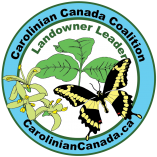
Landowner Leaders Profile
Ron Casier joined the Landowner Leaders program in February 2015. However, his efforts to practice good land stewardship on his 50-acre property near St. Thomas in Elgin County started many years ago.
Woodland stewardship and restoration
Ron’s first project was to steward the existing 10-acre woodland on his property and to increase forest cover.
Over several years starting in 1999, and with the assistance of the Elgin Stewardship Council, Ron reforested 10 acres of land with tree species native to the Carolinian zone. By choosing to restore the upland area adjacent to the existing woodland, Ron not only increased forest cover but created more interior forest, a type of habitat without which certain bird species simply cannot survive.
In his now 20-acre woodland, Ron provides habitat for woodpeckers by simply leaving a variety of dead standing trees (snags) and trees in declining health as is. He leaves all of the dead ash, beech and hickory trees to allow the woodpecker population to feed on the insects affecting these tree species. A pair of Pileated Woodpeckers now calls the woodland their home, and Ron is hopeful for the return of Red-headed Woodpeckers, a species at risk that once lived in his woods.
Leaving downed trees and debris in a natural state also enhances microhabitats for countless other animals and plants. Ron has also planted several native herbaceous plants in his woodland, including species-at-risk such as Green Dragon. This helps fill the void left by his annual removal of Garlic Mustard (whose growth Ron has noticed appears to be inhibited by the native May-apple).
His efforts to restore his woodland have also benefited the approximately 4 acres of swamp located within the original woodland area. Ron’s hope is for his woodland swamp to one day become home to Prothonotary Warblers. He has installed several nest boxes in the swamp in the hopes of enticing this endangered species to breed here.
Windbreaks
In the last couple of years Ron has enhanced the cedar windbreaks he planted years ago on the western and northern boundaries of the property by planting-in other native tree and shrub species.
Pollinator Habitat Creation
Ron maintains two types of habitat for native pollinators on his property: a ¼ acre patch of tallgrass prairie which includes native plant species such as Big Bluestem and Indian Grass, as well as a 1/3 acre patch of meadow which contains Common Milkweed, the Monarch butterfly’s host plant.
Participating in American Chestnut Recovery
American Chestnut is a tree species native to the Carolinian zone that is endangered due to the introduced Chestnut blight disease. Ron has dedicated one acre of his property to the Canadian Chestnut Council, who has planted hundreds of American Chestnut for its blight-resistance breeding program. Ron is making additional land available for out-planting of additional American Chestnut stock.
One of the goals of this program is to replace hybrid chestnut trees that were once planted in reforestation projects with blight-resistant American Chestnut individuals once available.
Ron also engages with neighbours who have reported wild American Chestnut on their properties. By putting them in touch with the Council, naturally blight-resistant trees have a better chance of being identified. One such tree may well have been found through Ron’s networking activities, which would make it only the third blight-resistant tree to be found in the province so far.
Future Projects
Ron’s future projects for his property include cutting off the farm drainage tile (installed in 1985 with the goal of drying up the swamp). This project will restore the natural water table level in the woodland. Ron would also like to construct snake hibernacula to coax the return of Milksnakes on his property.
It is clear that Ron is succeeding in meeting the three most important goals of his Carolinian Habitat Action Plan by undertaking actions to: nurture his appreciation of nature; protect and restore wildlife habitat; and enhance the investment value of his property.
